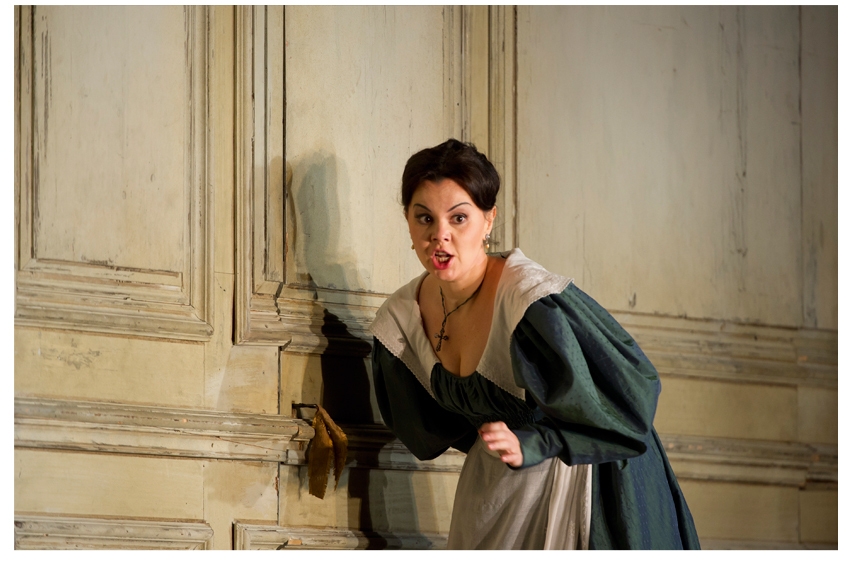A few weeks ago I was speculating anxiously on the possibility that even the greatest masterpieces, in opera or other art forms, might be exhaustible, or that anyway I might not be able to find anything fresh in them, and therefore might succumb either to a state of mild boredom, or else, like some critics, irritably demand that every production ‘break new ground’, as if it is the job of directors and performers to cater primarily to jaded palates. Any production of an opera which bewilders an audience that knows, at least in moderate outline, what the plot is, who the characters are, is a betrayal of the work: even the most demanding of operatic composers can’t have expected that people would have as many opportunities to see their works as have been rendered possible by technological achievements, whether electronic in the form of CDs, DVDs, and so forth, or aeronautical. On the other hand, now that such opportunities are available, how could one resist seeing or listening to the masterworks of the repertoire quite often?
There is no opera which there are more chances of seeing than Le Nozze di Figaro. Fortunately, it turns out to be a sturdier specimen than almost any other piece apart from La bohème, and the lassitude which I found was threatening in the Royal Opera’s revival of Don Giovanni and Così fan tutte never seemed a danger in Figaro, admittedly the least irritating of the three productions. David McVicar’s 2006 production is re-directed, not for the first time, by Leah Hausman, who has some new ideas each time round. Nothing alters drastically, there is still an enormous amount of superfluous movement; characters express their deepest and most private feelings with hordes of extras standing round.
The Almaviva household may be one where privacy is hard to come by, but if it’s non-existent this story of intrigues and secrets becomes no more than, as described in the current number of the Independent’s guide to current events, ‘a comic farce’. One of the extraordinary things about the da Ponte operas is that situations that would normally only be encountered in a farce are common, but associated, not only by the characters but also by the audience, with anxiety. That is only possible because Mozart establishes his characters so surely, and so roundedly, that we care about them even at their most ridiculous. McVicar and Hausman do a lot to undermine that by their inclination to slapstick, and by diverting our attention from moments of reflection and indecision. The one brilliant coup, not exactly illuminating but arresting, is at the end of Act III, when the performers on stage all freeze while the lighting changes for the magic of the last act, in the garden.
The cast in this revival ranges from the superlative to the barely endurable. Fortunately, Figaro and Susanna are the best cast, and that pair can rescue, or justify, anything. Aleksandra Kurzak has appeared in this production before, but though always wonderful, she has never been so complexly in possession of the role, so that while her Act IV aria is the climax of her part, perhaps of the opera, it hardly stands out from the erotic energy, delight and resourcefulness that she has shown the whole way through. Ildebrando D’Arcangelo’s Figaro is not quite on this exalted level, but his voice is firm, his projection perfect, and his relationship to all the other characters entirely plausible. These two make a strong contrast with their master and mistress. The Count was to have been sung by Simon Keenlyside, but he cancelled all performances, and has been replaced by Lucas Meachem. He has little stage presence, and a woofy voice, which proved incapable of handling his great but difficult aria. Like the other lead singers, he sang it from the centre of the stage, hands outstretched to the audience — how can such a stupid piece of direction get past, or be initiated by, this experienced team of director and conductor?
The Countess, Rachel Willis-Sørensen, came across as too mature (in the current euphemistic sense) and vocally unwieldy. She managed her plea for forgiveness well, but the Count’s answer, however well meant, was weak — and criminally greeted by the audience with laughter. In fact, there was a lot of laughter, as if many of the audience were seeing Figaro for the first time: great that they were, and that they found it funny — as long as they realised its other great qualities too. Anna Bonitatibus seemed a promising Cherubino in 2008, but this time round is too hefty and in no way boyish. The rest of the cast is adequate and experienced.
Antonio Pappano’s conducting is admirably paced, lucid and dramatically alert, but at certain moments — when a kind of spiritual grace descends on the work, at curious and unexpected places, but it can be to overwhelming effect — he moves on imperviously.






Comments